Doctors' safety concerns 'not taken seriously' at Glasgow hospital
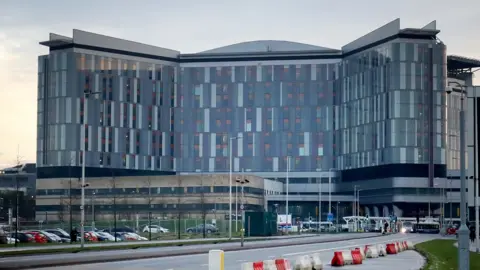 PA Media
PA MediaSenior doctors at Scotland's biggest hospital have said their attempts to raise concerns about risks to patient safety were not taken seriously.
They told BBC Scotland's Disclosure they were branded troublemakers for raising the alarm.
A series of infection outbreaks - and at least four deaths - are being investigated at the Queen Elizabeth University Hospital campus in Glasgow.
There were fears that the infections could be linked to the building.
The £840m flagship hospital campus, which includes the QEUH and the Royal Hospital for Children next door, opened in 2015.
In September last year, the Scottish government announced a public inquiry after it emerged there had been widespread water contamination and substandard ventilation at the site.
Now doctors who worked in infection control for NHS Greater Glasgow and Clyde have spoken publicly for the first time about their concerns.
'We don't put things in writing'
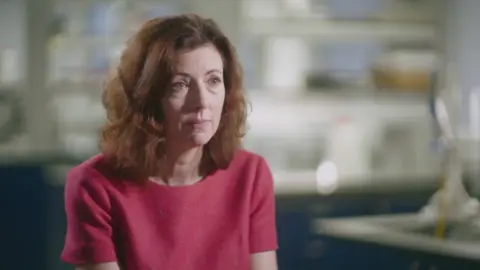
Dr Christine Peters, a consultant microbiologist, said she raised issues about ventilation and the water supply in "writing" when she started work at the health board in 2014, before the hospital was opened.
She said: "I was phoned by a more senior person to say to me, 'you're new to Glasgow, but here we don't put things in writing because of inquiries and things'."
Dr Peters said she was concerned about the 14-storey building's ventilation strategy and about the risk of infection from the water supply.
She wanted to see the water risk assessments, which are a legal requirement for a new public building.
It was not until late last year that Dr Peter's saw reports on the analysis of the water in the hospital.
A leaked report showed that warnings about the risk of water contamination were issued just days after it opened.
The 2015 inspection report ranked infection control measures as "high risk" in several areas.
It warned of a risk of stagnating water in parts of the huge building, increasing the risk of infection and that cold and hot water supplies were not running at the right temperature.
Dr Peters said her reaction to the leaked report was "horror".
"I just couldn't believe it and what most I couldn't believe is that I hadn't been told," she said.
'Basic control measures are not actually working'
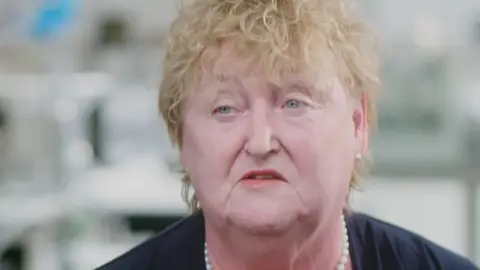
The Disclosure programme commissioned public health expert Susanne Lee to look at the leaked report, which had flagged up a high-risk of infection in the hospital's water supply.
She said: "It would take a long time to go through all the matters I was really concerned about.
"There's all sorts of things, problems in here with management of water temperatures. These are your basic control measures that are not actually working."
Dr Lee says that if she had seen the report before the hospital opened she would have advised a delay.
Concerns about water and ventilation
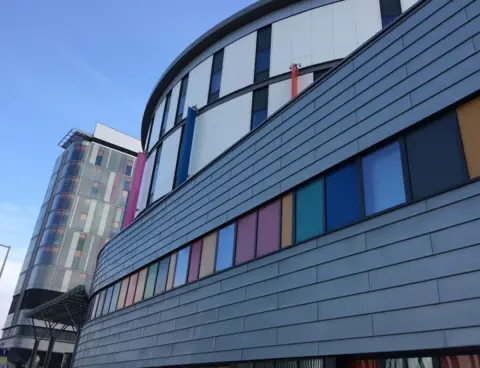
Dr Teresa Inkster was in charge of infection control at the time infection rates spiked in the children's cancer wards.
In 2018, two cancer wards at the children's hospital were shut because of concerns about infection, and children were moved next door to the QEUH instead.
Dr Inkster told the BBC she too had raised concerns about water and ventilation three years earlier in 2015.
"It was fairly standard practice for a new hospital, for information to be available to local infection control teams," she said
"So as a doctor who was new to the site, just a couple of months after opening, I was really keen to see what specialist ventilation areas we had, how they'd been validated, were there any issues with them?
"I was keen to see the results of air quality testing, because that impacts on patient safety.
"And I was also keen to get an understanding of the water system, and whether there had been any issues either prior to or just after opening. None of those were forthcoming."
'People were anxious about raising their concerns too strongly'
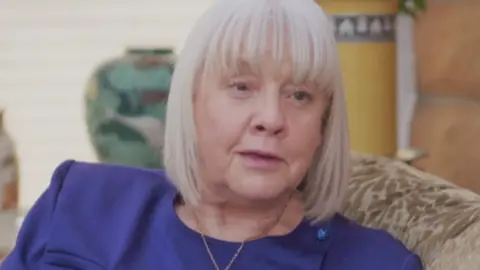
As some doctors became increasingly worried their warnings were not being listened to, a few became whistleblowers.
Dr Penelope Redding was clinical director for diagnostics at the health board and said she raised concerns with the current and former chief executives.
The retired microbiologist told the programme: "People were anxious about raising their concerns too strongly and so I went to senior managers within the board to give them the concerns and explain the concerns people had."
'It's absolutely vital that whistleblowers feel they can speak out'
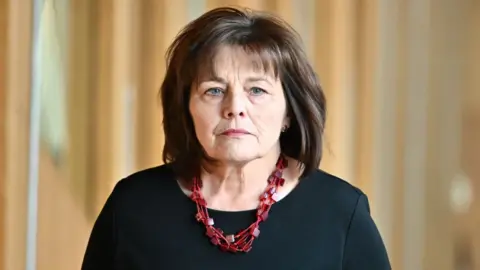 Getty Images
Getty ImagesThe health board said these issues have been investigated thoroughly. It said action had been taken and the hospital was safe.
The board also said they welcomed the public inquiry which is to be held into the issues at the hospital.
Scotland's health secretary said NHS staff must be supported to speak out about patient safety.
Jeane Freeman told the programme: "For me it's absolutely vital that whistleblowers feel they can speak out.
"We need people who are the deliverers of care to be able and willing and feel unintimidated to tell us.
"Where they think that there is improvement that is needed we should be prepared to listen to that and to act on it."
"I need to get justice for Milly'
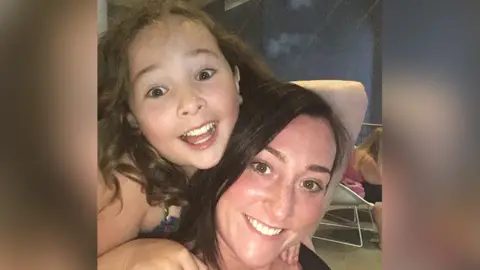 Kimberly Darroch
Kimberly DarrochMilly Main was being treated for leukaemia in the cancer wards when she died after contracting an infection in 2017.
Her mum is grateful to whistleblowers for speaking out but she still does not have the answers she needs.
"I think they think I am just going to forget about everything that has happened, that it is just going to get clouded over but at the end of the day, Milly didn't have a voice and I am now her advocate," she said.
"I need to get justice for Milly. None of this is going to bring Milly back but I need to know what happened to her and be sure that is the truth."

Previous Disclosure investigations include:
